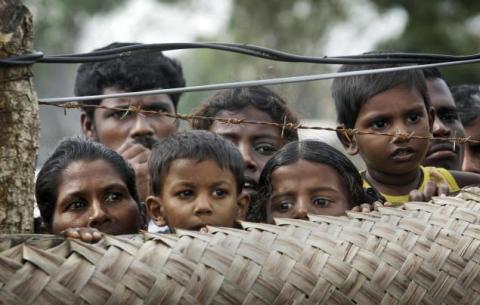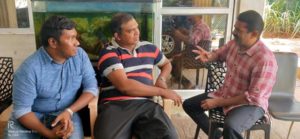18 May -Tamils worldwide observe Tamil Genocide Remembrance Day
![Eleven years ago, on this day -18 May 2009, the three-decade-long war for Tamil Eelam ended with the massacre of the fighting forces of Eelam Tamils and innocent Tamil civilians at Mullivaikkal village, on the north-east coast of Sri Lanka -which became the theatre of war in the final stages of the Sri Lanka-Eelam battle. The war with weapons may have ended but the battle for human rights and justice for genocide continues. Human rights and political activists have been […]](https://www.theworldsikhnews.com/wp-content/uploads/2020/05/Sri-Lanka-360x266.jpg)
Eleven years ago, on this day -18 May 2009, the three-decade-long war for Tamil Eelam ended with the massacre of the fighting forces of Eelam Tamils and innocent Tamil civilians at Mullivaikkal village, on the north-east coast of Sri Lanka -which became the theatre of war in the final stages of the Sri Lanka-Eelam battle. The war with weapons may have ended but the battle for human rights and justice for genocide continues. Human rights and political activists have been crying hoarse since that day, observing it as Tamil Genocide Day. WSN presents a video presentation of human rights activists -Dr Paul Newman and Dawning Jeeva -who have been at the forefront of espousing the Eelam Tamils human rights cause at various UN forums.
The armed struggle for Eelam homeland may have ended eleven years ago, but the political struggle for survival, human rights, justice for the genocide of Eelam Tamils, honour and dignity of Eelam Tamils will continue,” said Naam Tamilar Katchi leader Seeman while releasing online the video presentation of the work done by human rights activists -Dr Paul Newman and Dawning Jeeva.
Since 2010, the Tamil world across Tamil Diaspora has been knocking the doors of various United Nations forums to highlight the right to self-determination of Eelam Tamils, pin-point the accountability of the Sinhalese Sri Lankan leadership which perpetuated the genocide of Eelam Tamils and urge the international community to intervene in declaring Sri Lanka a rogue state.

“It was the need of the hour to keep the issue alive and seek justice in the international arena such as the United Nations Human Rights Council and we have been consistently doing that to the chagrin of the Sri Lankan government, said Dr Paul Newman, who specialises in conflict resolution and as the video shows has participated and presented the Eelam Tamils case in a forthright manner in many meetings of the UN Human Rights Council.
The government of Sri Lanka has always been in a denial mode and under the pretext of Covid-19 restrictions did not allow protests in the Tamil stronghold in Sri Lanka.
Joining the chorus of protest on the Tamil Genocide Anniversary, Dal Khalsa spokesperson Kanwar Pal Singh said, “It’s almost 11 years since the Sri Lankan Government carried out “anti-Tamil pogroms, sexual violence and acts of cultural and linguistic destruction. Even the 12-year-old son of Tamil nationalist leader V. Prabhakaran was summarily executed. A series of photographs dated 18 May 2009 show Balachandran Prabhakaran, was captured alive and killed at a later stage.”
“The armed struggle for Eelam homeland may have ended eleven years ago, but the political struggle for survival, human rights, justice for the genocide of Eelam Tamils, honour and dignity of Eelam Tamils will continue.
“Dal Khalsa has been supporting the demand that Mahindra Rajapaksa, other leaders and the Army chiefs and their forces must be brought to justice and hauled up for genocide and crimes against humanity,” he added.
Even though the Eelam fighters are no more engaged in any armed struggle, still 16 of the 19 divisions of the armed forces are stationed in Tamil-stronghold North Sri Lanka. The more than 150,000 Tamils who disappeared involuntarily in Vanni are still to be accounted for.

Dr Paul Newman states in the video that Sri Lanka should immediately demilitarize the north part of Sri Lanka and allow the civilians to lead a normal life. His compatriot Dawning Jeeva told WSN that, “the documentary gives an overview of steps taken to make the international community aware of Eelam political concerns and right to self-determination. We will continue to raise our voice against atrocities and human rights abuse.”
The documentary lays bare that in its 72-year existence as an independent country, Sri Lanka has not honoured any commitment to Tamil people nor to the international community. In fact, it has backed out of resolutions under one pretext or another.
We need justice..We need independent investigation abt Tamil genocide in eelam.Until then we’ll rise our voice & transfer details about the incident to next generation which we’re hope someday the world will listen.We will definitely make them to listen.#JusticeForTamilGenocide pic.twitter.com/IK0zIEW5aH
— Thamizhselvam BSH (@thamizhbaby) May 18, 2020
It would be futile to give more time to Sri Lanka. The United Nations Security Council or the UN Human Rights Council must set up without delay an Independent International Investigation Committee on Genocide in Sri Lanka 200-2010. The accountability of the Sri Lankan government must be determined and steps must be taken to prosecute the guilty.
On this day, it is disastrous to note that the Sri Lankan government unabashedly announces that the armed forces or political leaders will never be tried or punished for their role in the Sri Lanka-Eelam war. The video presentation tells us that, “the structural Genocide on Tamils is still going on.”
#JusticeForTamilGenocide
Tamil GenocideToday is 11th aniversary of Tamil Genocide in Sri Lanka.I pay my deepest homage to my Tamil Brothers/ Sisters who attained martyrdom fighting injustice.I pray to god the flag of Tamil Eelam fly high in skies and my Tamil Brothers get freedom pic.twitter.com/NgNTQrnbUX— Bhagwant singh (@bhagwantvirk1) May 18, 2020
Twitterati is abuzz with the hashtags #TamilGenocideRemembranceDay and #JusticeForTamilGenocide trending with thousands of Tamils joining in lambasting the abuse of human rights by Sri Lanka in association with India and other countries.
#JusticeForTamilGenocide#TamilGenocideRemembranceDay
Eelam after the displacement pic.twitter.com/UMx5otvL5V— Caroline MahendraSinghᴺᵀᴷ (@carolkrish) May 18, 2020
Expressing solidarity with Tamils across the world, human rights activist Jagmohan Singh said, “Tamils are not alone in this cry for justice. We have to fight this battle unitedly. Genocide cannot be tolerated anywhere, anytime and against any peoples. What is 18 May for Tamils is 6 June for Sikhs. Remembrance Days will continue till we win the right to our distinct identity, honour and dignity.”
 Print
Print

 214
214

